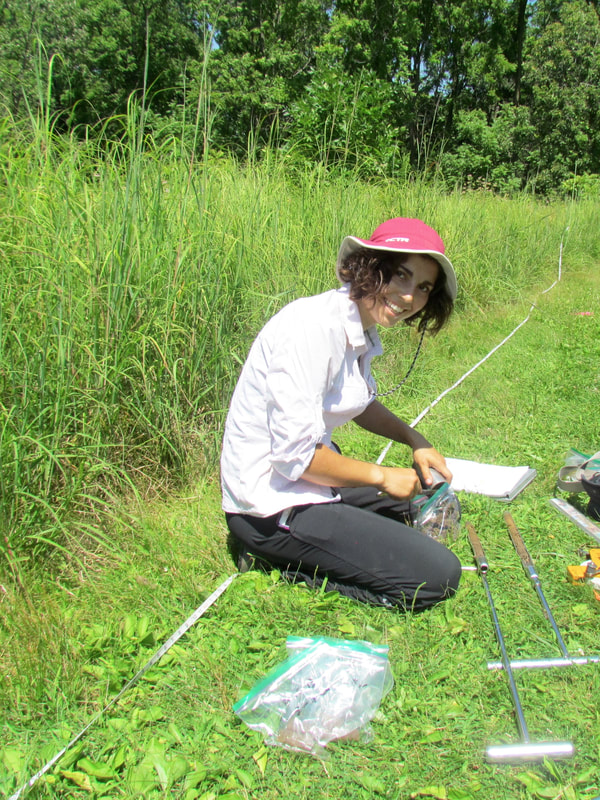To me, ecohydrology encompasses all of the many ways that water interacts with our ecosystems. Because I tend to work in urban areas these days, I often think about ecohydrology in an urban context. How is water moving through and interacting with these very modified and built-up ecosystems, and what does that mean for the people who live there? How can we design cities to make room for water?
What are your undergraduate and graduate degrees in?
I have a BSc in Environmental Biology (Statistics minor) from the University of Guelph, an MSc in Biology and Natural Resource Sciences from McGill University, and a PhD in Integrative Biology from the University of Wisconsin Madison.
How did you arrive at working in/thinking about ecohydrology?
I actually have limited formal training in hydrology, so it's something I arrived at through years of working in related disciplines of ecosystem and urban ecology (and if I'm honest, being referred to as an "ecohydrologist" can still bring on a little bit of imposter syndrome!). A large component of my work focuses on understanding multiple ecosystem services (benefits we receive from nature) in urban landscapes. So for me, ecohydrology provides a toolkit that can help me to measure or quantify the water-related benefits provided by urban green space (runoff regulation, flood protection, or water quality regulation, for example). My research requires a lot of breadth, which often means borrowing methods or approaches from other fields. I really love working at this intersection of many fields, but being interdisciplinary also means that I can lack the depth of knowledge that a more disciplinary scientist might have. Fortunately, I’ve had the opportunity to work with great colleagues (including excellent ecohydrologists!) to help refine my methods and ideas throughout the research process.
What do you see as an important emerging area of ecohydrology?
As an urban ecologist, I’m particularly interested in work tackling how climate change will alter the hydrology of our cities – and what we may be able to do to buffer these changes. In many cities we are going to experience significant changes in precipitation, from increased drought to more extreme rainfall events. Can we adapt to water-related challenges by changing the composition, configuration, or management of our urban green spaces? How can we integrate nature-based solutions, or “safe to fail” green infrastructure into our cities to accommodate changing precipitation regimes?
Do you have a favorite ecohydrology paper? Describe/explain.
A paper I return to often is Kate Brauman et al.’s 2007 paper “The Nature and Value of Ecosystem Services: An Overview Highlighting Hydrologic Services”. It’s a wonderful overview of the many ways ecohydrological processes influence ecosystem services.
A more recent paper I enjoyed is “Working towards a more holistic set of hydrologic principles to teach nonhydrologists: Five simple concepts within catchment hydrology” (Shaw et al, Hydrological Processes). As someone who isn’t trained in hydrology but often uses it in my work, I really appreciate papers like this that might clue me in to something fundamental I’ve missed, or correct a misunderstanding I have about the field.
What do you do for fun (apart from ecohydrology)?
I enjoy spending time with friends and family, and like many ecologists I love spending time outdoors in nature when I can. I also really enjoy pursuing more artistic hobbies in my free time. I’ve recently taken up ceramics, so I spend a lot of time at the pottery studio, and I also knit. There’s something about creating tangible objects that I find incredibly refreshing after days spent teaching/coding/writing!

 RSS Feed
RSS Feed